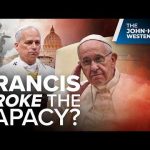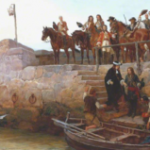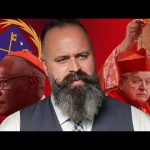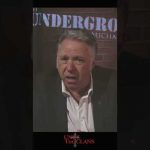Father Alberto Reyes has emerged as a critical voice against the extreme poverty and repressive actions of Cuba’s police state, having himself experienced both and seen them in the lives of his fellow Cubans. / Credit: Rachel Diez/EWTN Noticias
ACI Prensa Staff, Mar 13, 2024 / 16:00 pm (CNA).
In an interview with EWTN Noticias, the Spanish-language sister service of EWTN News, Cuban priest Alberto Reyes spoke about his apostolic ministry in Camagüey province, located in the central area of the island, and about how his defense of religious freedom on the island has earned him friends and enemies alike.
Reyes did not hesitate to say that in Cuba “communism will not survive” and “the Church will remain.”
The Cuban priest works in Esmeralda, a small town “that was once flourishing,” according to EWTN Noticias correspondent Rachel Diez. Today, the daily life of the people is the same as that of many others in Cuba, one of “sadness, migration, and deprivation,” he commented.
Since his ordination, Reyes has always been involved with the peripheries of society, in areas that have been very poor, but with a community of faithful always willing to serve just as they are in Esmeralda.
The diocesan priest has been a critical voice against the extreme poverty and the repressive actions of the police state, since he himself has experienced both and has seen them in the lives of fellow Cubans.
Reyes shared that although he grew up in an environment close to the Church, he never thought about consecrating his life to Jesus. “There are people who say that I’m very brave, but that’s not true,” he said.
“I think I’ve learned to flee forward [instead of running away from a problem to face it head on]. I have learned not to be taken captive by fear,” he added, noting that he has seen for himself the extreme poverty that exists in Cuba. “In Maisí [Guantánamo province] I saw children sleeping in cardboard boxes, something I had never seen before.”
The priest explained that he felt the need to let the outside world know about the suffering of the Cuban people in order to contrast that terrible reality with what the state propaganda apparatus presents to the world.
“This is a Cuba that’s going hungry and that’s a reality: People are hungry. That Cuban paradise of television and international propaganda doesn’t exist. What hurts me most about this Cuba is the hopelessness. People feel like they can’t do anything; they’re afraid,” Reyes said.
This fear, the priest continued, is understood because every time Cubans have expressed their disagreement with the communist regime, they have been silenced “with beatings and jail.” He recalled the spontaneous street protests of July 11, 2021, and said that they were a sign that the people “don’t want this system.”
That day thousands of Cubans took to the streets to call for freedom and better living conditions. The mass protests were violently repressed by the regime of President Miguel Díaz-Canel and to this day hundreds of the protesters are still in prison.
As the priest sees it, in 1959 the country supported the so-called Cuban revolution because “they were deceived” by Fidel Castro, who promised to restore the democracy that the dictatorship of President Fulgencio Batista had suppressed. “We were deceived and a [new] dictatorship was established, which is a prison that continues to this day,” he added.
“Let us be a free and prosperous people, because there is no right to keep this people in the misery that they are in,” Reyes said.
Several religious in Cuba have dared to denounce the abuses of the regime. Personally, Reyes has been the subject of “acts of repudiation,” the regime’s term for orchestrated acts of harassment against critics of the government who are singled out as enemies of the people.
“There have been many threats, sometimes worse and sometimes less. I feel like I’m doing what I have to do,” he said and condemned the violence and persecution to which dissidents are subjected in the country.
Finally, despite the obstacles and the complicated situation that Cuba is experiencing, the priest said that to achieve true change in the country, it is necessary to have “a people that accepts God and embarks on paths of prosperity and peace.”
This story was first published by ACI Prensa, CNA’s Spanish-language news partner. It has been translated and adapted by CNA.















